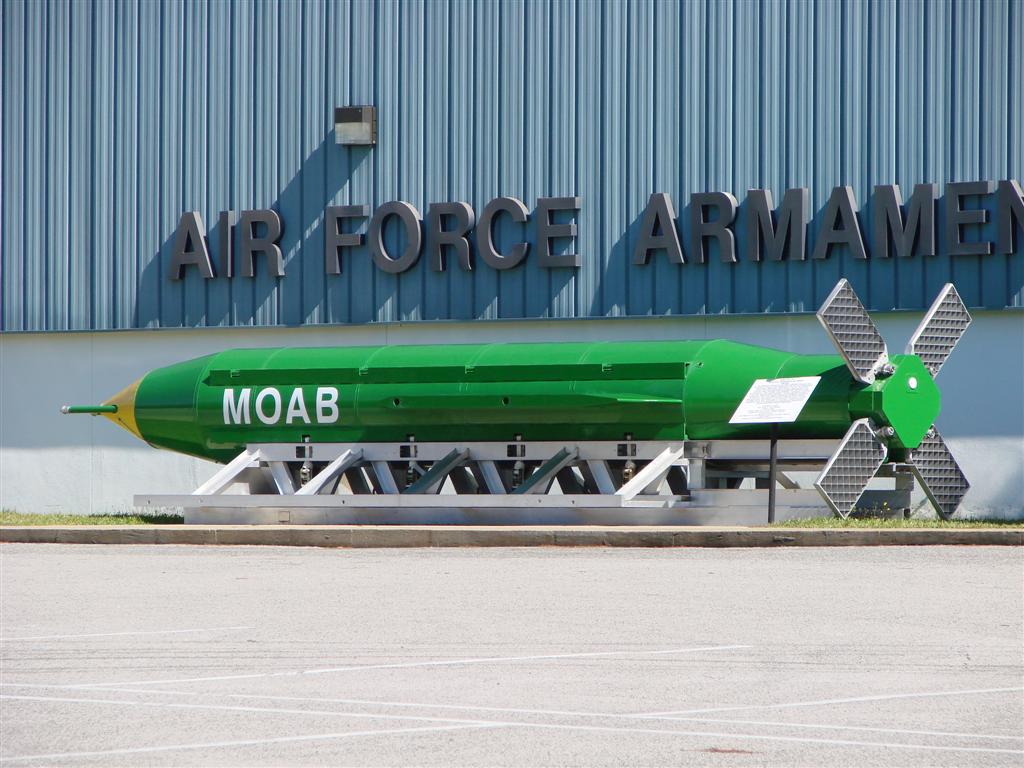On Thursday, April 13th, the United States dropped a powerful bomb, nicknamed the “mother of all bombs,” on Afghanistan. The Massive Ordinance Air Blast Bomb was dropped at 7:32 PM, with the goal of targeting an ISIS cave and tunnel complex located in the Nangarhar province. This event set a unique precedent, as MOAB is the United States’ “most powerful non-nuclear bomb,” and a weapon of its type has never before been used. Weighing 21600 pounds and spanning thirty feet, MOAB is a weapon of massive proportions, but its consequences carry even greater magnitude.
The timing of this MOAB launch is particularly interesting. Bombs of this type have been ready to use since 2003, yet have not been dropped before. Why launch now? It is possible that this was a strategic maneuver, but more likely it is representative of the Trump administration’s increased willingness to use military powers.
According to Afghanistan’s ambassador to the United States, the conflict between ISIS and the allied US Special Forces and Afghanistan’s troops was particularly intense in the last week. It’s possible that the US military viewed the bombing as a strategic move to gain an upper hand in the conflict. According to Afghanistan’s ambassador, the tunnel complex and the surrounding area had previously been mined with explosives, preventing the advance of US and Afghan troops. The MOAB may have removed this obstacle. Bolstering this hypothesis is White House Press Secretary Sean Spicer’s statement that the strike “targeted a system of tunnels and caves that ISIS fighters use to move around freely.” This viewpoint of strategic necessity is questionable though, given that the US has steadily been gaining some ground on the battlefield. General Nicholson, the commander of US forces in Afghanistan, recently reported to Congress that ISIS-k, an ISIS branch based in the Khorasan province, “had lost about a third of its fighters and two-thirds of its territory during the last year to drone strikes and Special Forces operations.”
An alternative reason for the bombing may be that the Pentagon hoped it would be a signal to ISIS of the Trump administration’s determination to eliminate ISIS as a military threat using any measures necessary. As it turns out, the effectiveness of using the MOAB as a signal to ISIS is questionable. Time and time again, with other terrorist organizations, it has been shown that eliminating specific individuals in the organizational hierarchy has little long-run impact. Even if this stratagem was employed, there is still the question of why MOAB’s were not utilized in similar conflicts against Al-Qaeda or the Taliban in the past.
The more likely explanation for this decision is that this bombing required less bureaucratic approval than past military operations. President Trump declined to answer the question of whether he authorized the bombing, raising questions as to whether the executive branch even contributed to the decision to launch the MOAB. Moreover, authority to use the MOAB was passed off from General Joseph Votel, commander of US Central Command, to General Nicholson, representing a further delegation of this military power.
Compared to the Obama administration and those past, the Trump administration has expanded the authority of the Pentagon and its military maneuvers considerably. In general, since a set of raids on Yemen in January, it has been apparent that the Trump administration is transferring more authority to the Pentagon for military operations. With this change in the bureaucratic structure underlying military operations, it is likely that the choice to deploy the MOAB was influenced by decreased prerequisites of debate, discussion, and approval usually necessary for massive military action.
Following its drastic decision to deploy the MOAB, the Trump administration received much backlash. As of now, the military has not completed its assessment of casualties from the bombing, but maintains that “US forces took every precaution to avoid civilian casualties with this strike.” However, opponents of Trump’s MOAB decision have generally expressed concern for the precedent this sets for future military action. The former President of Afghanistan, Hamid Karzai, voiced his concerns for the wellbeing of the people of Afghanistan, as the MOAB’s usage may set a pattern of Afghanistan’s being repeatedly used as a testing ground for deadly weapons. Senator Elizabeth Warren also expressed similar concerns about civilian impact and the unprecedented timing of the decision. While it is unclear whether there have been civilian casualties after this particular bombing, the military will likely be unable to ensure the continued safety of innocent civilians if such powerful and dangerous weapons continue to be used.
While the MOAB attack on terrorist group members may result in a short-term power vacuum or a lack of manpower, it has become increasingly apparent that ISIS is a geographically widespread organization with political, economic, and militaristic tactics versatile enough to overcome such regional bombings. In order to employ an effective strategy against ISIS, the Trump administration and the Pentagon will need to focus efforts on less regional, and more pervasive military and political strategies that deliver long-term blows to the interests of ISIS. The MOAB bombing appears to be a shortsighted, heavy-handed tactic that can only be used a limited number of times in the interest of civilian lives and the volatile sociopolitical climate in the Middle East.
Image Credit: Wikimedia Commons/FI925
